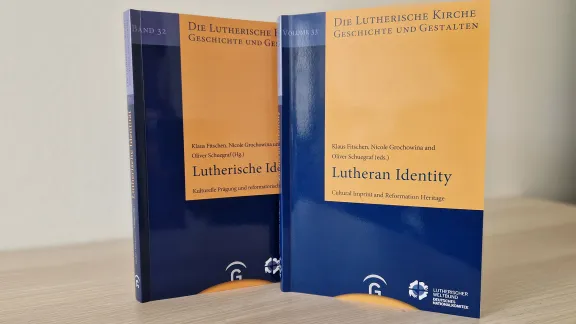A new publication presents contributions of an interdisciplinary conference organized by the GNC/LWF last year and contributes to the LWF’s study process on Lutheran Identities.

Cover of the new publication “Lutheran Identity – Cultural Imprint and Reformation Heritage”. Photo: GNC/LWF, Astrid Weyermüller
New publication on Lutheran identity as cultural imprint and reformation heritage
(LWI) – “Lutheran Identity – Cultural Imprint and Reformation Heritage” is the title of a new publication by the German National Committee of The Lutheran World Federation (GNC/LWF). The book presents the contributions of an interdisciplinary conference held in February 2022.
It is also a contribution to the Lutheran World Federation’s (LWF) study process on Lutheran identities, which was begun at the Twelfth Assembly in Windhoek, Namibia, n 2017, and focuses on what it means to be Lutheran today.
The new publication contributes to the process against a backdrop of “secularization in Europe and the growing Lutheran churches in Africa,” write the publication’s editors PD Dr Nicole Grochowina, Prof. Dr Klaus Fitschen, and Rev. Dr Oliver Schuegraf. It also looks into “theological questions that arise from the respective, context-related praxis pietatis and concern, for example, the role of the gifts of the Spirit or of the role of the contexts and traditions in which Lutheran identity unfolds.”
Identity, identities, and global perspectives
The publication includes a foreword by LWF General Rev. Dr Secretary Anne Burghardt and contributions from Germany and the global communion. They are organized in three sections: Identity from sociological, historical, and contextual perspectives, Lutheran identity and its historical and current expression, and an exemplary view of the world showing the importance of different contexts “that can hardly be overestimated,” write the editors.
The first contribution in the third section comes from Rev. Dr Chad Rimmer, LWF’s Program Executive for Lutheran Identity, Communion and Formation. He traces the dynamics that unfolded in the LWF as it began to address the question of Lutheran identity.
Zimbabwean theologian and World Council of Churches Program Director for Public Witness and Diakonia, Rev. Dr Kenneth Mtata, uses examples from the LWF’s history to demonstrate African contributions to Lutheran identity. He sheds light on how intercultural, political, missionary and pneumatological issues have been handled and emphasizes the need for a holistic perspective.
Dr Wilhelm Wachholz, Professor of Theology and Church History at the Faculdades EST, points to the challenges facing Lutheranism in Brazil and its multi-religious society.
Dr Gottfried Rösch, Director of the Evangelical Migration Center in the Greek House (Evangelisches Migrationszentrums im Griechischen Haus), Munich, elaborates on the identity challenges among Germans who have come from Russia and now live in Bavaria.
In the final contribution, Dr Jerzy Sojka, Professor of Historical Theology at the Christian Theological Academy in Warsaw, elaborates on particular challenges for Lutheranism in Poland, which – like the whole Polish society – had to come to terms with the freedom it had won after 1989 and the transformations that went with it.
The two editions of about 170 pages, “Lutheran Identity – Cultural Imprint and Reformation Heritage” and “Lutherische Identität – Kulturelle Prägung und reformatorisches Erbe” are available from Gütersloher Verlagshaus or from the GNC/LWF. Please direct inquiries to Martina Kruse at [email protected]


